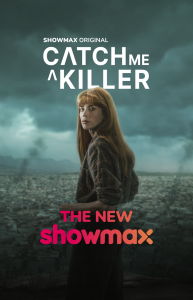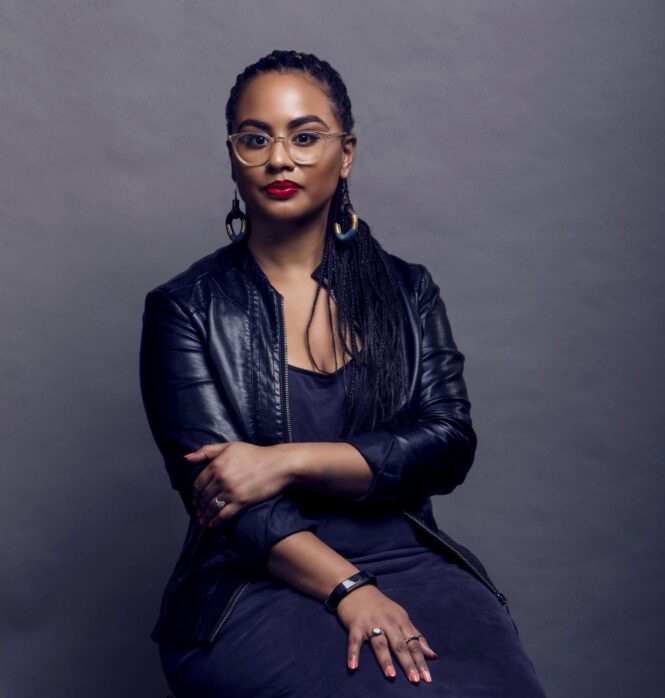
Adapted from Micki Pistorius’ memoir, the harrowing true crime series, Catch Me a Killer, is set in the mid-90s and traces Pistorius’ quest, as a newly qualified forensic psychologist, to track down South Africa’s most feared killers at a time when the country was gripped by an epidemic of rising crime and mass murder.
Each episode looks at another of her cases, from the Station Strangler to the Cleveland Killer to Stewart ‘Boetie Boer’ Wilken. Leading critic Leon van Nierop calls the Showmax Original, “One of South Africa’s best true-life crime series, with a fresh approach.”
Hear from Charlotte Hope and Donna Cormack-Thomson, who star in the series, as well as Amy Jephta, lead writer on the series.
“A lot of serial killers are desperate to be caught.”
- CHARLOTTE HOPE
 Charlotte Hope (Game of Thrones, The Spanish Princess) stars as Micki Pistorius, South Africa’s first-ever serial-killer profiler.
Charlotte Hope (Game of Thrones, The Spanish Princess) stars as Micki Pistorius, South Africa’s first-ever serial-killer profiler.
Why did you want to be involved?
CH: The simple answer is that my agent sent me the scripts and, genuinely, they were the best scripts I'd read in a long time.
It's a world that I find completely fascinating. I've always really been interested in the psychology of serial killers. I spent a lot of the pandemic with my partner listening to a YouTube channel called JCS - Criminal Psychology. It's amazing. Basically, it takes you through unedited interviews with criminals, and shows you what the psychology is from point to point to point. So it shows you when they're coercing, when they're threatening, when they're trying to get you on their side.
So when Catch Me A Killer landed in my lap, it felt like kismet. Most of the time, when you’re an actor, you get a project and you get to research all new stuff. When I got this, I realised I had actually been researching this on my own for a year. Then I got to study loads more. I’m a big nerd so that was really fun.
Micki uses her psychology training to really get into the minds of murderers, so she can help the police catch them. How do you think the audience will respond to her trying to empathise with serial killers?
CH: There's a difference between empathising with someone and condoning someone's actions. Micki, as a psychologist, had a huge amount of empathy for these people. There's a bit in her book where she says, “Serial killers are not monsters. They are human beings with tortured souls. I will never condone what they do but I can understand them.” That's also what I'm really trying to do as an actor. I can't judge my characters; I have to empathise with them.
A lot of serial killers, even in our show, are desperate to be caught. Because it's a pathology. And it's an instinct that they can't stop, and they need to be stopped. For Micki, the only way to stop them is by empathising with them, because understanding them, understanding their thought processes and understanding why they act the way they do, is the only way that you can trace them and catch them.
“Serial killers were children at some point.”
- AMY JEPHTA
 SAFTA winner Amy Jephta (Oscar entry Barakat, Showmax Original Skemerdans) is the lead writer on the series.
SAFTA winner Amy Jephta (Oscar entry Barakat, Showmax Original Skemerdans) is the lead writer on the series.
What’s it been like working with Micki?
AJ: Micki is a fascinating woman. She's been through a lot. She details a lot of that vulnerability and her journey with her career and her life in her book, and she's very uninhibited. It was incredible getting to know, in small doses, the real person behind those words. You have an idea of what a forensic profiler should be, and you think of them as quite solemn and stern and traumatised and affected, but Micki is just joyous. She has a bubbliness and effervescence. She's really quirky. It was a pleasure to work with her words.
What was it like telling a story about such a strong woman?
AJ: It’s always incredibly exciting to have a female-driven story, especially in a thriller. She’s in a man’s world; she was the only female forensic psychologist at that time in the SAPS. The way she does her job is unlike how a man would do it. It was exciting for me to figure out how a woman would think in this situation. What are the adversities that she faced? It was 1994. It was a time of discrimination, and she was underestimated. That’s my favourite kind of character to write: the character that nobody thinks is going to amount to much and then they soar. The underdog story is always the one I gravitate towards. And that's really her story. The underdog.
Tell us more about the writing team, and your process.
AJ: We had an incredible team of writers. We came together and started to think: how do you break this life story down? What was great is that each chapter in Micki's book is hard baked with a lot of intrigue and mystery. You can't help but have that when you’re hunting for a serial killer. That's literally the premise of each episode. It's to find out: Who is this person? What are they made of? Who are they psychologically? How can we pin them down? And that has its own inbuilt ticking clock.
It's not a whodunnit. It’s a whydunnit. Why did these people commit these acts? You're inside the perspective of these killers and the victim's families as much as you’re inside Micki's perspective. What we're trying to figure out is: how is she going to crack this case? What's going to be the thing that blows it open? How is she going to put these pieces together? How is she going to build this puzzle? And that's the essential mystery at the heart of the story.
How do you think the audience will respond to the way that Micki empathises with the serial killers?
AJ: I think the question of empathy is interesting, and it’s something that divided us as writers. On the one hand, it’s so hard to empathise with a serial killer, because they’ve crossed so many moral lines. But what makes Micki’s job so incredibly special is that she has to understand a killer’s humanity to catch him and put him behind bars where he belongs. You can’t understand the holistic makeup without understanding the childhood, without understanding the relationship with the parents, without understanding where they grew up. What were the socio-economic circumstances that shaped that mind? Why violence? Why these particular acts of violence? When you start delving into the makeup of a serial killer, you can't help but be touched by the humanity that is still somewhere within that person. Inside everyone is a child who came from somewhere. I think as a writer I have to be able to empathise with that, even if I don’t approve of it.
Do you think Micki’s story is relevant today?
AJ: What the story gives us is an understanding of the social context that shapes serial killers. The people who commit these heinous acts have so much in common and a lot of that has to do with their home life and the families in which they were raised. I don’t believe someone is born wicked; they are shaped by their environment. There’s a lesson to be learned about how we protect the minds and hearts of children, because they’re our most vulnerable.
The thing I keep returning to is that serial killers were children at some point. They were unloved. They were abandoned. They were abused. How can we protect each other and stop the vicious cycle of murder and violence in this country?
That these events happened in 1994 gives us some distance to reflect on what kind of society we’re shaping here in our country. I think it’s a mirror for South Africans to ask what it is about our country that makes these men so violent. What is it about South Africa that turns us into the murder capital of the world, or the place where, at one point in history, we had the highest number of active serial killers anywhere in the world? This, I think, is very relevant.
“I think we learn a lot about our own psychology by looking into the psychology of others.”
- DONNA CORMACK-THOMSON
 Donna Cormack-Thomson plays Erica.
Donna Cormack-Thomson plays Erica.
What makes Catch Me a Killer different from other crime dramas?
DCT: I'm a huge fan of true crime. I’ve listened to many a true crime series on podcast. I think what makes it different is that it’s all based on a true story. A lot of what we see and hear is these international crime stories. And the truth is that crime in South Africa is very intense. We hear people talk about Jeffrey Dahmer, and I’m not taking away from that, but some of these crimes in the 90s were absolutely horrific. We have a particular problem here with gender-based violence, rape and murder and so it hits very close to home.
I think what makes Catch Me A Killer different is the truth behind it, and the psychology of the criminal profiler, and how that really explores the humanity of our serial killers. But there’s also a big focus on the victims and their families. I think it’s a very interesting, very psychological, very intense crime series.
Tell us about your character, Erica.
DCT: Erica Botha is a detective. She’s a farm girl; she comes from the North West Province. She's tough, but she's also very caring. She did some of the criminal profiling courses that Micki offered, so she’s a huge fan. Micki is a role model for Erica. The way I thought of Erica is that she’s possibly had some kind of trauma in her past which led her in the direction of looking into the psychology of serial killers and crime.
Why do you think people love watching true crime so much?
DCT: As humans, we are often interested in that which is other to ourselves. We have a lot more access to information about crimes that have occurred all over the world. Maybe there’s an aspect of wanting to desensitise ourselves; to be able to accept the reality of what is out there. I also think we learn a lot about our own psychology by looking into the psychology of others. And this interests us. I find it quite surprising that women are especially interested in true crime.
Catch Me a Killer is currently being aired on Showmax.
Join the conversation: #CatchMeAKillerShowmax
YOU MAY ALSO ENJOY
You binge-watched the series, now binge-read the book









